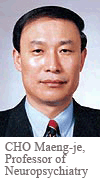 CHO Maeng-je, Professor of Neuropsychiatry at College of Medicine, released a government supported research result on April 13.
CHO Maeng-je, Professor of Neuropsychiatry at College of Medicine, released a government supported research result on April 13. According to the report, smokers and single elderly people are exposed to a higher risk of getting dementia.
The odds of people without a spouse getting dementia are 2.4 times higher than those who have a life partner. Smokers are also 1.5 times more likely to suffer from the disease than non-smokers.
CHO conducted the research on behalf of the Ministry of Health, Welfare and Family Affairs on 8,199 people over 65 years old last year.
``Being without a spouse at an elderly age could bring extreme lonesomeness, often leading to depression, which could be a contributing factor to dementia,'' CHO said. ``Men in particular are more vulnerable to the condition because they do not eat well without wives, which could break the balance of their health.''
Women over 85 years were 11.6 times more likely to get dementia than men of the same age group.
``It may be because women live longer and suffer from a lack of estrogen, one of the main stimulating properties affecting the brain after menopause,'' CHO said.
However, the disease can be controlled if detected in the early stages, the research team said. About 70 percent of diagnosed patients are in the primary stages at the moment, which can be controlled or diminished, though they might not be ``cured,''
Senile dementia is emerging as a critical issue in the nation. About 42,000 elderly people, some 8.4 percent of their age group, suffer from the disease as of 2008, showing that its prevalence doubles every 20 years.
The government expects the number of patients to top one million by 2027.
It advised people to use their bodies and minds more actively, to stop smoking, cut down on drinking, refrain from eating salty and spicy foods and to eat vegetables, nuts and fruit.
People are advised to exercise for half an hour more often than twice a week and to socialize frequently with neighbors.
The government provides free dementia detection tests at 192 local public healthcare centers nationwide. Steady treatment is the only way to control the disease. The health ministry will start providing comprehensive treatment services from July next year.
April 14, 2009
SNU PR Office

